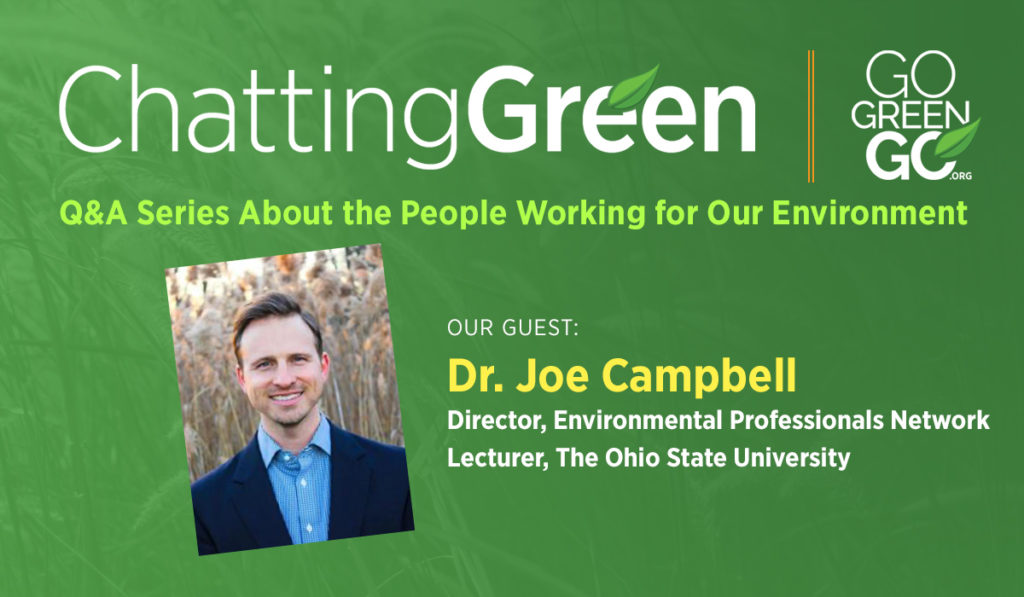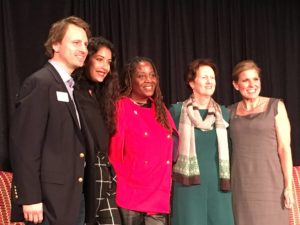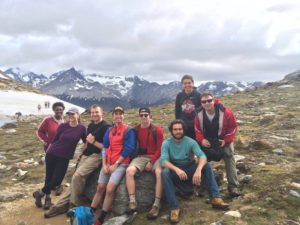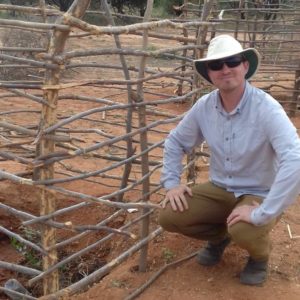Chatting Green with Dr. Joseph Campbell of Environmental Professionals Network
- Chatting Green
-
Jul 19
- Share post

Chatting Green is back with Dr. Joseph Campbell. Dr. Campbell is a Lecturer in The Ohio State University’s School of Environment and Natural Resources and Director of the Environmental Professionals Network. He’s lead research teams around the world for the US Department of Agriculture and EPA, and is working to build the Environmental Professionals Network into a unique networking resource for environmental professionals and those aspiring to enter this important space.
…
As a lecturer in Ohio State’s School of Environment and Natural Resources, you’ve conducted research for the US Department of Agriculture, EPA, and Office of Surface Mining, while also leading research teams around the world dedicated to mining and agriculture. Tell us a little more about your research and how it informs your work with students.
 I feel very fortunate to have had these opportunities. I think seeing how different rural communities are and how they can be endowed with such great and varying natural resources is a gift. We have a very diverse planet, and people go about shaping their communities in nuanced and complex ways though some similar patterns remain constant. Communities can’t exist without a natural resource base. Ideally resources are managed for a clean and healthy environment for humans and other living things. This is not equally achieved and we have some deep consideration about our roles as people on this planet to consider. Change is constant, how we respond to that, while being mindful of seven generations ahead is an evolving challenge and opportunity. I try – and each day is a new opportunity for practice – to lean into that uncertainty and to hear from as many voices, including students, as possible in a structured and an intentional way forward. This was a trying year for this work made further complicated for the type of participatory, socially-oriented research that I contribute to.
I feel very fortunate to have had these opportunities. I think seeing how different rural communities are and how they can be endowed with such great and varying natural resources is a gift. We have a very diverse planet, and people go about shaping their communities in nuanced and complex ways though some similar patterns remain constant. Communities can’t exist without a natural resource base. Ideally resources are managed for a clean and healthy environment for humans and other living things. This is not equally achieved and we have some deep consideration about our roles as people on this planet to consider. Change is constant, how we respond to that, while being mindful of seven generations ahead is an evolving challenge and opportunity. I try – and each day is a new opportunity for practice – to lean into that uncertainty and to hear from as many voices, including students, as possible in a structured and an intentional way forward. This was a trying year for this work made further complicated for the type of participatory, socially-oriented research that I contribute to.
What environmental topics do you see as garnering to most attention these days from students, faculty, and professionals?
The year 2020 and the first six months of 2021 have been very stressful on many people. One can’t disassociate the Covid-19 Pandemic and response from their daily lives, their families, their role and even life’s purpose. The release of greenhouse gasses into the atmosphere, their sources, our global economy’s dependence on this pattern is going to be a divisive issue. What we see on the political left, and much of the mainstream, is an interest in talking about climate change. I see that many Americans and Ohioans agree. I even see in some business communities interest in the potential profitability of these fields. So I want to say “climate change” is one of those topics – but it does polarize your audience. Putting “climate change” in the title will automatically signal to some a certain position. The science and reality is clear — our climate is changing, rapidly in relative terms, and human behaviors have helped drive this current inflection. Climate change intersects with nearly all fields of environmental and natural resource study so it’s imperative that – despite the challenges and pushback – that we keep applying the spotlight.
On this topic, environmental justice saw critically due attention recently. We need to be honest about history, capitalism, law, and their strengths and limitations and still dream for the future. I struggle greatly as an individual in suggesting solutions, though when I listen to others, especially those who have started on pathways of self-reflection and are mindful of the patterns listed above, then I feel a great strength and my faith grows. Climate change and environmental justice are such fields where this is deeply needed. From a very local and pragmatic environmental issues/topics perspective then I’d say algal blooms in Ohio water bodies, regulations for PFAS as a water pollutant source, and wildlife, such as deer, in urban spaces is seeming to garner much recent attention. At EPN we’ve also received interest in spotlighting invasive species removal and creation of pollinator habitat in both urban and rural spaces.
For individuals that want to go into an environmental field, what areas are showing the most promise for professional development?
 I’m not sure at this time. We often emphasis “STEM” though there was the trend for “STEAM” – inserting arts and other humanities into the very math and tech oriented side of the environmental field. My advice for someone going into the environmental field is to focus on the science, in other words understanding how individual pieces connect to form systems, apply methods that can evaluate the accuracy of systems and predictions, and always engage with great humility and curiosity. At times we are giving voice to beings and processes that don’t express themselves clearly in the economy or society at large. When you are sensitive to our environmental conditions and practiced in understanding and testing these assumptions, then communicate humbly and with respect to differing opinions. Be open to change in a society that will push you often to be (unreasonably) exact in your answers.
I’m not sure at this time. We often emphasis “STEM” though there was the trend for “STEAM” – inserting arts and other humanities into the very math and tech oriented side of the environmental field. My advice for someone going into the environmental field is to focus on the science, in other words understanding how individual pieces connect to form systems, apply methods that can evaluate the accuracy of systems and predictions, and always engage with great humility and curiosity. At times we are giving voice to beings and processes that don’t express themselves clearly in the economy or society at large. When you are sensitive to our environmental conditions and practiced in understanding and testing these assumptions, then communicate humbly and with respect to differing opinions. Be open to change in a society that will push you often to be (unreasonably) exact in your answers.
We say and we know that Ohio is home to thousands of environmental professionals working every day to make the world a better place. The EPN has provided a consistent in-person and online forum for supporting and growing this community with no end of stopping in sight.
In addition to being a lecturer you are also the Director of Ohio State’s Environmental Professionals Network. The EPN is a unique organization. How did it come to be?
I started working for the EPN in late 2017. All the stories I hear of its origin story tie it back to the work of David Hanselmann (retired in 2017). David is a very unique and special person. He is very selfless, leans in toward listening and trusting others, and has a lot of respect from the natural resource and environmental communities. Through his long tenure at ODNR and relationships with many diverse stakeholder groups I think he saw a gap in organization and around ten years ago approached some trusted members of his professional network and Ohio State’s School of Environment and Natural Resources to start a semi-formal breakfast club that would provide a forum on “Second Tuesdays” that were open to the public and included a dialogue on a set array of environmental topics. Those topic areas and the overall process and structure were set in 2012. We say and we know that Ohio is home to thousands of environmental professionals working every day to make the world a better place. The EPN has provided a consistent in-person and online forum for supporting and growing this community with no end of stopping in sight. Though times, faces, and places continue to change, David’s personal commitment to fueling this network and selfless nature still inform our month to month process.
What is the mission of the EPN, and what does it offer participants?
The EPN seeks to connect and inspire those who are passionate about and committed to the environment and natural resources. We hope to offer these individuals programs and forums to grow and to be more effective in their work through these connections. We offer ways to connect both virtually (through an online communication portal) as well as in-person networking events. Certainly our format has changed over the past 18 months. The mission hasn’t changed. Our topic areas are broad – air quality; education, health and policy; water; energy, materials and sustainability; environmental careers; and land use. Our programs and networking usually fall into specific subsets of these categories and overlap in interests and the work itself is common.
What are the goals of the Environmental Professionals Network, and what do you have planned for the coming year?
We want to keep expanding the network and to dive deeper into some specific environmental issues. We have data from our program attendance over the past 18 months that shows that our movement to virtual programs allowed us to expand our audience while serving our core mission. We know we have a mission to serve in hosting in-person forums that are affordable, accessible, and topically relevant to Ohioans. We will return in September to this with the best quality of programs that we’ve ever had. What is new is the addition of virtual participation. We’ll see a lot of movement towards “hybrid” programs in the near future. We’ll see how this evolves for us and others. I’m excited for the new challenge and opportunity of making quality space and value for people physically in a room and those connecting from wherever through live, social interaction on compelling environmental topics.
On a personal level, what drew you to a career in environmental studies? What environmental issues are closest to your heart?
 I think each day it’s important to find items that motivate me. I grew up near a Columbus park named Antrim Lake. It’s a beautiful site and former quarry. State Route 315 cuts right through this park. I found peace and self-realization there as a young person. I think that influenced me in learning how I can find peace among what can some like much chaos. I’ve learned that others find similar peace in nature and it’s inspiring how people build networks to create a few more preserved places for natural things. (on nearly each day) I love people and I love the spaces that help humans find peace, solace, and a place of inner-harmony that helps them be their best. I’ve found in my own life nature, close to my home is something that works for me and many others. I think it’s a natural element of humanity however not everyone seeks it in this form. Natural resource and environmental assets come in many shapes and forms. Not everyone lives in a place where they can access the outdoors and some natural environments safely. I’ve lived in some very diverse places, I’ve been blessed with peace and safety in accessing natural places most of my life. I dream where folks find some element of nature each day. My work often focuses on the improvement and functionality of ecosystems in environments highly disturbed by humans. Some days are really tiring, some days are really motivating. Learning what environmental issues connect with others then identifying stars of individuals with similar dreams and the alignment of those stars into constellations for action forward is the most motivating aspect of my work.
I think each day it’s important to find items that motivate me. I grew up near a Columbus park named Antrim Lake. It’s a beautiful site and former quarry. State Route 315 cuts right through this park. I found peace and self-realization there as a young person. I think that influenced me in learning how I can find peace among what can some like much chaos. I’ve learned that others find similar peace in nature and it’s inspiring how people build networks to create a few more preserved places for natural things. (on nearly each day) I love people and I love the spaces that help humans find peace, solace, and a place of inner-harmony that helps them be their best. I’ve found in my own life nature, close to my home is something that works for me and many others. I think it’s a natural element of humanity however not everyone seeks it in this form. Natural resource and environmental assets come in many shapes and forms. Not everyone lives in a place where they can access the outdoors and some natural environments safely. I’ve lived in some very diverse places, I’ve been blessed with peace and safety in accessing natural places most of my life. I dream where folks find some element of nature each day. My work often focuses on the improvement and functionality of ecosystems in environments highly disturbed by humans. Some days are really tiring, some days are really motivating. Learning what environmental issues connect with others then identifying stars of individuals with similar dreams and the alignment of those stars into constellations for action forward is the most motivating aspect of my work.
What would you say to a person wanting to get involved, but who maybe feels overwhelmed by the expanse of environmental issues we face?
There are long-term, committed environmental professionals in Ohio. These folks inspire me. They are smart, adaptable, evolving. I would advise first, finding people in your life or work who you can have deep, meaningful conversations about an environmental topic to help you find ways to get involved that are more in-depth and can perhaps deepen your understanding of a particular issue. At the same time, utilize social networks to “follow” and occasionally communicate with those that you may not know well but you are aware that they do great work with various organizations or places. This approach can help you diversify your understanding and knowledge of who is working on what. Your interests can change over time, though sticking to some core issues, while remaining inspired and connected to others is critical. These folks can help you stay interconnected with the solutions being explored and employed that help take the good steps forward. In Ohio we have the EPN and many other forums (like Go Green Go!) that can assist with this. I understand the feeling of being overwhelmed. All environmental issues are interconnected. Trying to wrap one’s head around, and make sense of, this is overwhelming just to start. My answer to this question is likely different from what I would have suggested 18 months ago. People have absorbed a lot of change, made sacrifices, experienced frustration and grief, and are likely to be feeling overwhelmed and many more emotions in a way that looked different before. Please take time for yourself because you are part of the environment too! Finding the trees, natural environments that keep me grounded and aware of why I care drives me on the hardest days.
- Air Quality
-
+27 Arts, Climate Change, Conservation, Diversity Equity and Inclusion, Environmental Advocacy, Environmental Education, Environmental Justice, Farming and Gardens, Fracking, Green Space, Habitat Restoration, Indigenous History and Culture, Oil Gas Pipeline, Outdoor Recreation, Parks and Trails, Pollution Prevention, Public Health, Recycling, Renewable Energy, Rivers Streams Lakes, Sustainability, Trees Forests Plants, Water Quality, Watershed, Wetlands, Wildlife, Zero Waste
